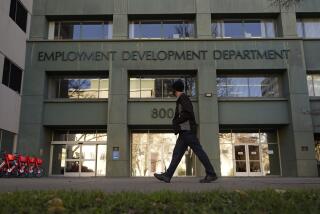New Team Keeps Eye on Defense-Contract Fraud
- Share via
SAN DIEGO — A new, low-profile branch of the Defense Criminal Investigative Service has moved here in order to keep an eye on part of the more than $100 billion awarded annually to private firms by the U.S. Department of Defense.
Although the service was formed three years ago, only in the last two months has San Diego been added as one of its 10 field offices. Two of its 200 agents will be staffed here, and there are plans to add another.
“San Diego leads all other California cities in numbers of military and civilian personnel on Department of Defense-related payroll,” said Rodney Hansen, special agent in charge of the service’s operations in Southern California, Arizona and Hawaii.
Hansen, based in Laguna Niguel, heads a staff of 15 investigators. The San Diego agents are Bill Burgess, who broke open the Coastal Equities real estate fraud case, and Frank Beatty, who specializes in investigating fraudulent government obligations, bonds and food stamps and counterfeiting.
More than $3 billion worth of Defense Department contracts are awarded annually to San Diego-based companies and more than 80,000 military and civilian personnel depend on that money for jobs.
Military and defense-related expenditures have increased under the Reagan Administration, with the biggest increases registered in California--”and the largest of those were in San Diego,” Hansen said.
The service’s job is to ferret out fraud, waste and abuse in those contracts.
Armed with full law enforcement powers, the service is investigating several San Diego companies and claims about 100 cases in Los Angeles. Since 1980, six firms have been prosecuted.
Predominant among potential frauds are improper billings and cost charging, such as time cards for non-existent workers, as well as product substitution, price fixing, bidding irregularities, white-collar procurement crimes and misuse of Champus, the government military health care plan.
“We employ a variety of investigative tools, including undercover work,” Hansen said. If the fraud involves only the Army or Navy, however, those branches use their own investigative teams, he said.
More to Read
Sign up for Essential California
The most important California stories and recommendations in your inbox every morning.
You may occasionally receive promotional content from the Los Angeles Times.













